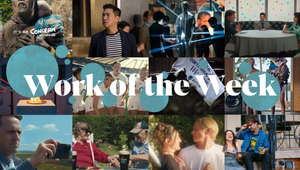
Cannes Jury Insights: A Celebration of the Creative Spirit, Good Business and No AI

Cindy Gallop, founder and CEO at MAKELOVENOTPORN, Gustavo Lauria, co-founder, resident and chief creative officer at We Believers, USA, Tor Myhren, VP marketing communications at Apple, and Debbi Vandeven, global chief creative officer at VML assembled on Friday morning to reveal the Grand Prix winners for arguably the most prestigious categories at Cannes Lions 2024. They discussed the sheer love of the work, the scrutiny that awards around social change demand, recognising the commercial risks of certain innovations and how there was, as many of us had hoped, more humour and less gen AI awarded this year.
Read on to find out the key insights from the jury presidents of the Glass, Sustainable Development Goals, Film, Grand Prix for Good and Titanium Lions.
Glass: The Lion for Change
Jury president: Cindy Gallop, founder and CEO at MAKELOVENOTPORN
Having led the inaugural jury for it in 2014, Cindy Gallop returned to her role as jury president for the 10th year of the category that celebrates progress against gender inequality and prejudice. And she was asking her jury members to bring “extreme cynicism” to bear on the work they were considering this year.
Reflecting on the change that has occurred since the Glass Lions’ creation, Cindy noted: “there is now a far better understanding of how systemic and endemic gender inequality is. And it was very gratifying to see gold-standard creative solutions being applied to those underlying factors and those embedded issues.”
“We all agreed that live presentations is a game-changer,” she said. But she told the press conference that some gender-based prejudice was on show even in these pitches, when there were men involved, “dynamics that we as a jury were very unhappy about witnessing.” Cindy noted that one member of the jury will be feeding that back to the entrants involved, “so that the men can learn and change.”
The jury was unanimous in agreeing the Grand Prix winner, which Cindy revealed is Vaseline’s ‘Transition Body Lotion’, which they applauded for demonstrating that “driving social change is good business,” the extent of R&D that went into developing the lotion specifically designed for trans people’s skin and the appropriate level of inclusion of the trans community in its development.
Cindy also revealed that while the Glass jury adored the Orange ‘WoMen’s Football’ campaign, they felt it didn’t meet their metric for success, which for this category was not about impressions or any kind of commercial goals, but systemic change. In fact, the jury agreed that they would love to see it win a Film Lion. Incidentally, it won the Grand Prix in Film.
Sustainable Development Goals
Jury president: Gustavo Lauria, co-founder, CCO and president at We Believers
In considering work to award for the Sustainable Development Goals Lions, Gustavo Lauria observed that this year saw creative projects working to solve all of the 17 goals laid out by the UN. “This time it wasn't about trends, it was about solving real problems,” he said. “And I think that that's a true sign of how our industry is evolving and evolving to bring real solutions.” It was also clear that there is no particular geographical area dominating this area of creative problem solving – the 20 Lion-winning projects came from 15 different countries.
Gustavo recognised a trait which he is happy to see growing in the industry, which he called ‘creative common sense’ – “those ideas that people can understand, those ideas that not only scientists or engineers create. Something that you can create in your agency, and then, with the help of the experts, make them happen in a real way.”
The Grand Prix went to Renault ‘Cars to Work’, which built on the trend for commerciality being tied in with purpose. This project, “helps people but it’s really good for the business as well,” he said. He also felt it was particularly worth applauding work that makes progress like this when it comes from a large company like Renault, which makes the risks higher.
Film
Jury president: Tor Myhren, VP marketing communications at Apple
Tor Myhren loved the ease with which his jury took to evaluating work for the oldest category at Cannes Lions. Films should speak for themselves, he said, so he had no qualms revealing that they barely watched the case studies (“maybe a couple,” he said). Cultural context was given extra attention, however, to make sure that the jury understood the work as its intended audience should.
The biggest trend by far, Tor stated, was the average length of the entries. “This has been going on for years now, as the transition from television to online has happened [...] There was a lot of long form, and 99% of it was too long. If you're putting a film online, that's a tough ask. They're asking people to actively choose to watch it. And so it has to be great.” So a broad take away from him and his jury was “the industry needs to get better at short form.”
Comedy work from Thailand was particularly strong this year, which brought Tor and the jury immense joy. Casting, performance, and timing were all exactly right, he said. “It just gets funnier and better and weirder, and I love it, and our jury loved it.”
Two films were awarded the Grand Prix, but for very different reasons. Firstly, Orange ‘WoMen’s Football,’ which Tor admitted is “not a perfect film [..] but it makes you feel so much. To see it is to love it.” And secondly, ‘Play It Safe’ for the Sydney Opera House. While Orange was “best idea on film of the year”, Tor said this was the “best film of the year.” In fact, its message and tone, which is a true “celebration of the creative spirit,” is so perfect for the Cannes Lions Festival of Creativity, that Tor suggested to LIONS chairman Philip Thomas that he closes the Festival with it this year – a request which the Lions boss appreciated, but declined.
A notable trend was actually the lack of a trend that some may have predicted – generative AI. Tor said there was no discussion of gen AI on his jury, and the other presidents confirmed that it was not a big talking point. In fact, Tor and fellow president Debbi Vandeven both felt it was worth highlighting that even the clever technology that powered Grand Prix-winner ‘WoMen’s Football’ was good old CGI, not gen AI.
Grand Prix for Good
Jury president: Debbi Vandeven, global chief creative officer at VML
The Grand Prix for Good was awarded to ‘The First Speech’ for Reporters without Borders. Debbi Vandeven decided to read a prepared speech about the importance of this piece of work and why the jury felt that protecting the free press was a particularly important cause for this Lion to celebrate in 2024:
“In today's unparalleled age, the preservation of free speech for generations to come is crucial. ‘The First Speech’ is a captivating series of films that skillfully combine simplicity and creativity to leave a lasting impact on the viewer. The collection of these films illuminates a critical issue affecting global democracy and the evolution of communications.”
The Dan Wieden Titanium Lions
Jury president: Debbi Vandeven, global chief creative officer at VML
Debbi encouraged people to chart the history of Titanium winners over the years to see how they defined the direction that the industry is travelling in. She did that in preparation for her presidency. “I found that in every situation, it actually was a point in time that changed what you thought about the industry you're in. Even more so, it just represented that point in time,” she said.
With that in mind, Titanium Lions went to four campaigns, with the Grand Prix going to ‘Doordash All the Ads’, which Debbi was keen to stress is not just a Super Bowl ad but “so much bigger.” She ventured that it was in fact a product demo that makes you rethink the delivery platform’s entire business. In a category which has often tracked the industry’s journey in purposeful advertising, it was notable to see a winner that is about driving commerce. “It is unapologetically commercial,” said Debbi. “It's also just a really good idea. It's about creativity, right? And making you rethink the way you might do something. And so this one stood out. But I will tell you we did see in that entire list [...] we only had one that was an NGO that we shortlisted. I think that's great. I mean, we got into this business to sell products and services and change behaviour, and I think it's wonderful, as long as that work is as good as anything else.”
Additionally, almost half of the entries had some component of B2B in them – a trend which she saw as a positive uplift in creativity in that area. “What I'm thinking right now is that our B2B category is going to be getting more and more creative as we move forward.”
‘Meet Marina Prieto' for JCDecaux was one of the other Titanium winners, which provoked another nod to the human and tangible beating out artificial intelligence this week. Debbi pointed out that by taking Instagram posts and putting them on paper posters, that campaign was “almost the opposite of AI.” Summing up this potentially surprising trend, Philip Thomas joked, “So nothing to say about AI, let’s all just move on. Come on.”
One thing which does seem to have had an uptick this year in general is comedy. Thanks to the addition of the humour section into all the Lions, it seems that more of the industry has entered its funny work. “I'm delighted to see that that's been taken up by the industry,” said Philip, because this week, if you've seen the award shows, there's a lot of laughs in there, and what's wrong with that?”















